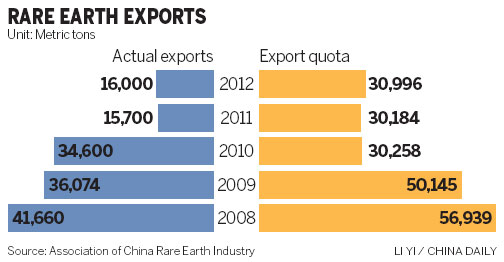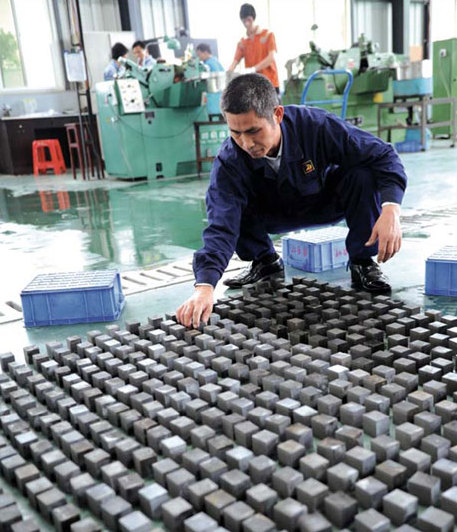Recovery on horizon for rare earth sector
|
|
|
A worker dries neodymium iron, a kind of rare earth, at Jiangxi Leiyuan Magnet Material Co Ltd in Ganzhou, Jiangxi province. Ganzhou is one of China's major mining centers for these elements. [Xinhua] |
Rare earth demand and prices are expected to grow slowly, after hitting two-year lows, according to an official at China's industry association.
China, the world's biggest supplier of rare earths, set the export limit for 2013 at a similar level with last year when it issued its second batch of export quotas for the year on Monday.
Twenty-four companies, including China Minmetals Corp, Aluminum Corp of China and Baotou Iron & Steel Group, will be allowed to ship 15,500 metric tons of rare earths under the second round of quotas, the Ministry of Commerce said on Monday. Of the total, 13,821 tons are light rare earths and 1,679 tons are medium and heavy rare earths.
This second batch of quotas takes the year's export total to 31,001 tons.
Weak global demand meant about half of last year's export quota went unused. In 2012, the quota was 30,996 tons, but only 52.5 percent was used.
This year's quota is 5 tons higher than last year and the highest since 2009.
Lin Boqiang, director of the China Center for Energy Economic Research at Xiamen University in Fujian province, said the stagnant global economy indicates that actual rare earth exports this year are likely to be well below the quota level.
Chen Zhanheng, deputy secretary-general of the China Rare Earths Industry Association, said the government held the quotas steady to avoid charges that it is engaging in "manipulation" of rare earth exports and prices.
The World Trade Organization last year agreed to probe China's export limits and tariffs for rare earths, following complaints that the curbs breached the rules of global commerce.
Rare earth metals include 17 elements that are widely used in high-tech products.
Chen said actual exports this year are likely to be higher than in 2012, as lower prices have spurred demand from major user countries, including the United States and Japan, whose economies are recovering.
He noted that Japan's dependence on rare earth supplies from China has increased and is likely to continue to climb, as its reserves decline.
Last year, Japan used 14,470 tons of rare earths. It is expected to increase consumption this year, Chen said.
According to The Nikkei, in the first four months of this year, Japan's imports of rare earths increased 19 percent year-on-year to 4,300 tons.
China supplied 63 percent of those imports, up 11 percentage points year-on-year. Rare earth prices are also expected to rebound after hitting bottom over the past two years, he said.
The growing cost of environmental protection has increased costs for producers, and production suspensions have also kept supplies lower, he added.
But a price surge such as that seen in 2011 is not likely to recur, he said.



